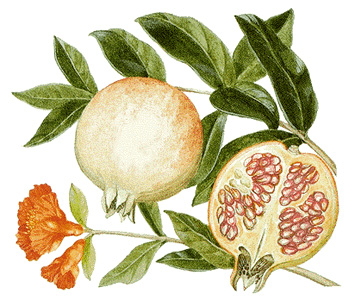Pomegranate, << POM `gran` iht, >> is the fruit of a plant raised in warm climates. The plant grows wild in western Asia and northwestern India. It also is grown commercially in the United States and especially thrives in the San Joaquin Valley in central California. The plant is bushlike when wild, but under cultivation it is trained to grow as a small tree. It reaches a height of 15 to 20 feet (4.6 to 6 meters) and bears slender branches. Scarlet flowers grow at the ends of the branches.

The fruit is about the size and shape of a large orange and has a hard rind. It has a deep gold-red color. The fruit contains many seeds. Each seed is inside a layer of crimson pulp which has a pleasant, refreshing taste. The pulp is used to make cooling drinks.
The pomegranate was familiar to the Israelites in Biblical times. A picture of it appeared on the pillars of Solomon’s Temple. In classic mythology, Persephone was forced to spend one-third of each year in Hades’ underworld kingdom because she had eaten pomegranate seeds while living with Hades.
